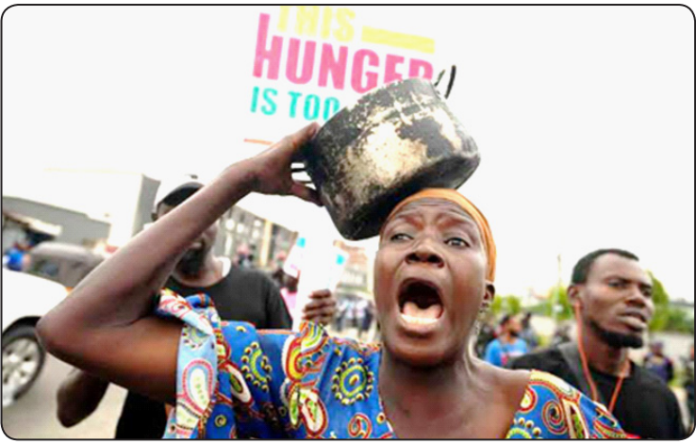FOR the first 10 days in August, Nigeria was shaken by a nationwide demonstration known as the “Hunger Protest” with citizens across five of the six geopolitical zones taking to the streets to vent their frustrations and dissatisfaction with the current state of affairs.
The protest, being the first of its kind, was sparked by the consequences of President Bola Tinubu’s abrupt policy changes on May 29, 2023, specifically the removal of the fuel subsidy and the floating of the Naira. These moves led to a dramatic surge in the cost of living which has pushed many Nigerians to the brink.
Petrol, which was priced at N195 just 17 months ago, now costs N900. For a civil servant earning the minimum wage of N30,000, supporting a family of one spouse and four children has become nearly impossible. The situation is further exacerbated by the skyrocketing costs of necessities; a bag of rice now exceeds N80,000.
Despite the ongoing hardship, President Tinubu has consistently urged Nigerians to endure and remain patient, promising that their sacrifices will eventually lead to positive change. However, this call for endurance has been undermined by the apparent disparity between the sacrifices expected from the general public and the extravagant lifestyles of elected officers.
Four days into the protest, the president’s attempt to placate Nigerians with a lengthy 38-paragraph speech fell flat, with many viewing it as mere rhetoric rather than a substantive response. His address, embellished with palliatives to address economic challenges was at best repetitive. Despite his assurances of improvements in government revenue, infrastructure projects, support for agriculture, and initiatives to boost youth employment and education, his promises lacked impact.
The President’s assurances are yet to translate into tangible relief for ordinary Nigerians, otherwise, the protest would have been needless. Instead, these policies seem to exacerbate the hardship as they fail to result in improved access to food, at least.
Now that the atmosphere has calmed and the protests have waned, with significant casualties reported particularly in the North, President Tinubu needs to address Nigerians again because currently, it is estimated that around 80 per cent of Nigerians have lost confidence in his Renewed Hope agenda.
It would be prudent for him to reconsider the removal of the fuel subsidy and explore its reinstatement to provide immediate relief by stabilizing fuel prices and mitigating the cascading effects on the cost of living. This measure would not only alleviate financial pressure on households but also help control inflation, offering a more balanced approach as the government works on long-term economic reforms.
The President should also understand that floating the Naira cannot be effectively sustained without a substantial boost to Nigeria’s productive capacity. China’s success with a managed float system, for instance, is underpinned by its status as a global manufacturing powerhouse, with $344 billion in monthly exports as of June 2024. This robust export base supports a stable currency by generating significant foreign exchange reserves and mitigating trade imbalances. In contrast, Nigeria’s monthly exports, predominantly crude oil, amount to only $3 billion, exposing the Naira’s vulnerability to fluctuations in global oil prices.
Given this disparity, continuing to float the Naira without enhancing Nigeria’s productive sector poses significant risks. The currency’s instability, driven by external shocks and inflationary pressures, adversely affects the cost of living for Nigerians. Unlike China, which benefits from a diverse and expansive economy, Nigeria lacks the economic depth to absorb such fluxes. Reconsidering the floating policy coupled with investments in production and export diversification, would provide a more stable economic environment and better support the Naira’s value.
If the President fails to heed the voice of the people, there is a real fear of even more intense protests in the future. He must move beyond palliative measures and focus on creating a conducive economic environment rather than forcing Nigerians into a state of dependency and despondency. Effective solutions require more than temporary fixes; they need comprehensive reforms that empower citizens and stabilize the economy, rather than perpetuating a cycle of economic hardship.


